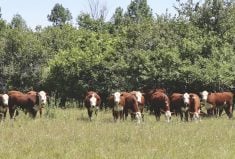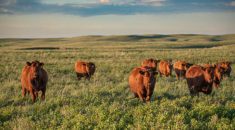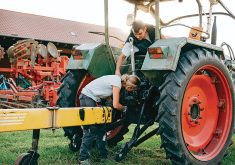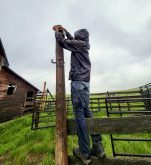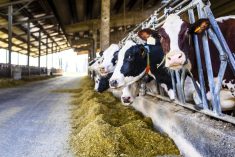The pandemic hasn’t just prompted more housebound urbanites to undertake property improvements — more farmers are also looking at conservation projects.
ALUS Canada — which helps fund projects such as fencing riparian areas or protecting wildlife habitat — has seen more applications since COVID-19 struck, said Christine Campbell, ALUS Canada’s western hub manager.
“We’ve actually seen an uptick in the number of expressions of interest for the program this year, and that’s really exciting,” she said. “It varies from community to community, but overall, we’ve probably seen a 20 per cent or more increase in interest. That’s without being able to do the more traditional forms of outreach that we’d normally be doing over the summer.”
Read Also

Farming Smarter receives financial boost from Alberta government for potato research
Farming Smarter near Lethbridge got a boost to its research equipment, thanks to the Alberta government’s increase in funding for research associations.
Campbell attributes that increase to the fact that everyone is sticking a little closer to home as a result of COVID-19.
“This is the year they can finally get some of those projects ticked off the to-do list.”
Despite the increase in interest, producers may still be able to access funding for ALUS projects if they live in one of Alberta’s 14 participating communities.
“At this point in the year, there are some communities that might be getting close to capacity in their wait lists, but for the most part, projects are able to be accommodated,” said Campbell.
This province has been a hot spot for ALUS initiatives. In Red Deer County, water is a top priority, said Innisfail farmer Rod Bradshaw, who sits on that county’s Partnership Advisory Committee.
“Protecting water sources is where a lot of our efforts have been in the Red Deer region,” said Bradshaw. “There are a lot of water bodies we want to protect because the public at large is using quite a few of these, either for recreation or for drinking water. It’s important that we protect the quality of that.”
ALUS Canada recently signed up a new supporter of its New Acre program, in which companies or individuals can sponsor stewardship projects. The plant-based milk division of global food giant Danone is donating $100,000 to support conservation projects in seven ALUS Canada communities across the country, including Red Deer County and Lac Ste. Anne County (along with four in Ontario and one in Quebec). Danone’s Silk brand is a leading maker of soy, almond, and other plant-based milk.
“Silk and Danone, its parent company, expressed a strong interest in supporting farmers and farming communities during this challenging time,” said Katherine Balpataky, ALUS Canada’s director of corporate partnerships and business development. “So while I won’t say the timing was good, it was well timed to make this announcement.
“It will help farmers and ranchers in those communities establish nature restoration projects, which will ultimately create cleaner air, cleaner water, and wildlife habitat in Alberta,” added Balpataky.
Bradshaw hopes Danone’s backing will spur other support for and interest in the program.
“The unfortunate thing is there’s not unlimited funds, so we’re hoping that, down the road, other organizations will take a look at supporting ALUS and helping further enhance our projects,” he said.
Campbell agrees.
“It really helps to show the investment that’s being made in farmers producing ecosystem services on our marginal lands,” she said. “These are areas that just aren’t productive for agricultural purposes for whatever reason, where it’s difficult to make a profit from an agricultural standpoint but where we can have a profound impact by producing ecosystem services.
“ALUS provides a really great solution for those marginal lands that ultimately helps keeps the farm business productive, as well as the land that supports that farm. It’s a win-win-win scenario.”



